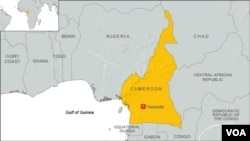With the backdrop of World Heart Day on Monday, medical experts said more than 80 percent of people living in French-speaking, central African countries who suffer cardiovascular diseases do not know it.
And, they added, a majority die while receiving treatment from traditional healers rather than medical doctors.
Foukougang Eric, a traditional healer in Cameroon's capital, Yaounde, said he specializes in the treatment of heart disease.
"When somebody comes and he is tired, he cannot make strong movements, he cannot do sports, sometimes he has pain in the neck and sometimes there is paralysis and he could be bed ridden. We have certain medicinal plants that we give," Eric said.
Believes in treatment
Among the 10 patients waiting in the healer's office is Nji Mary, 62, who suffers from hypertension. She told VOA that she believes she has been successfully treated.
Mary said she came to the traditional healer because hospitals did not help her and is happy with her treatment from Eric.
Medical personnel in central Africa said many types of heart disease that were traditionally associated with high-income countries are increasing in Africa.
Dr. Euloge Yangnini of Cameroon's Heart Foundation said half the population of Africa is at risk.
Yangnini said there are 1 billion people around the world suffering from cardiovascular problems and each year there are 30 million new cases reported.
He said the situation is alarming in Africa because 50 percent of adults have cardiovascular problems.
Dr. Tajou Emmanuel of Cameroon's Cardiac Society said the increase in heart disease is mainly because of the urbanized and Westernized lifestyles in Sub-Saharan Africa.
"Now what are we doing, we have cars, we don't practice sports any more, we smoke, we drink," Emmanuel said. "Stress also contributes a lot. I said we smoke, we drink a lot and those things are contributing factors to the rise of cardiovascular diseases."
Yangnini said those most at risk are Africans who are poor, lack health insurance and cannot raise the money needed for treatment and open heart surgery and so resort to traditional healers for treatment.
He said Africans should stop the habit of waiting or looking for solutions to their problems from suspicious sources.
Yangnini added the best thing for people with cardiovascular problems is to consult medical doctors as early as possible.
Health begins at home
The Reverend Sister Getrude Nkenglefack of the Cardiac Center at St. Elizabeth Catholic General Hospital in northwestern Cameroon said this year's World Heart Day theme -- creating heart-healthy environments -- encourages people to be watchful and avoid the risk of heart failure.
"Create a suitable environment for your heart, [watch] your diet, what you give to your kids, post smoking bans in your house, encourage exercises, not sitting and watching TV for long hours, encourage physical exercise, walk and do sports," Nkenglefack said.
Cardiovascular diseases are a major public health concern worldwide and account for about 10 percent of total deaths in Africa, where they are the leading cause of death in those over the age of 45.
The World Health Organization estimated that by 2030, more than 23 million people will die annually from cardiovascular disease.




